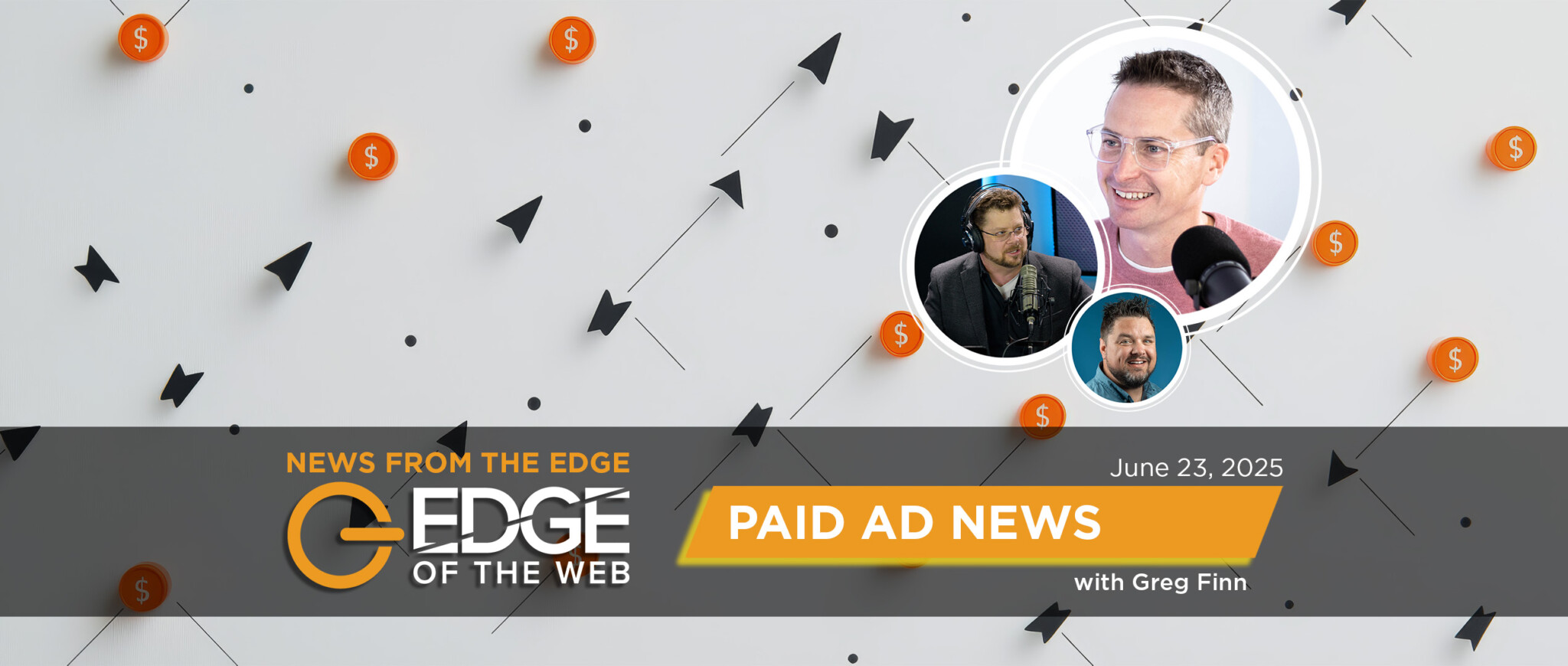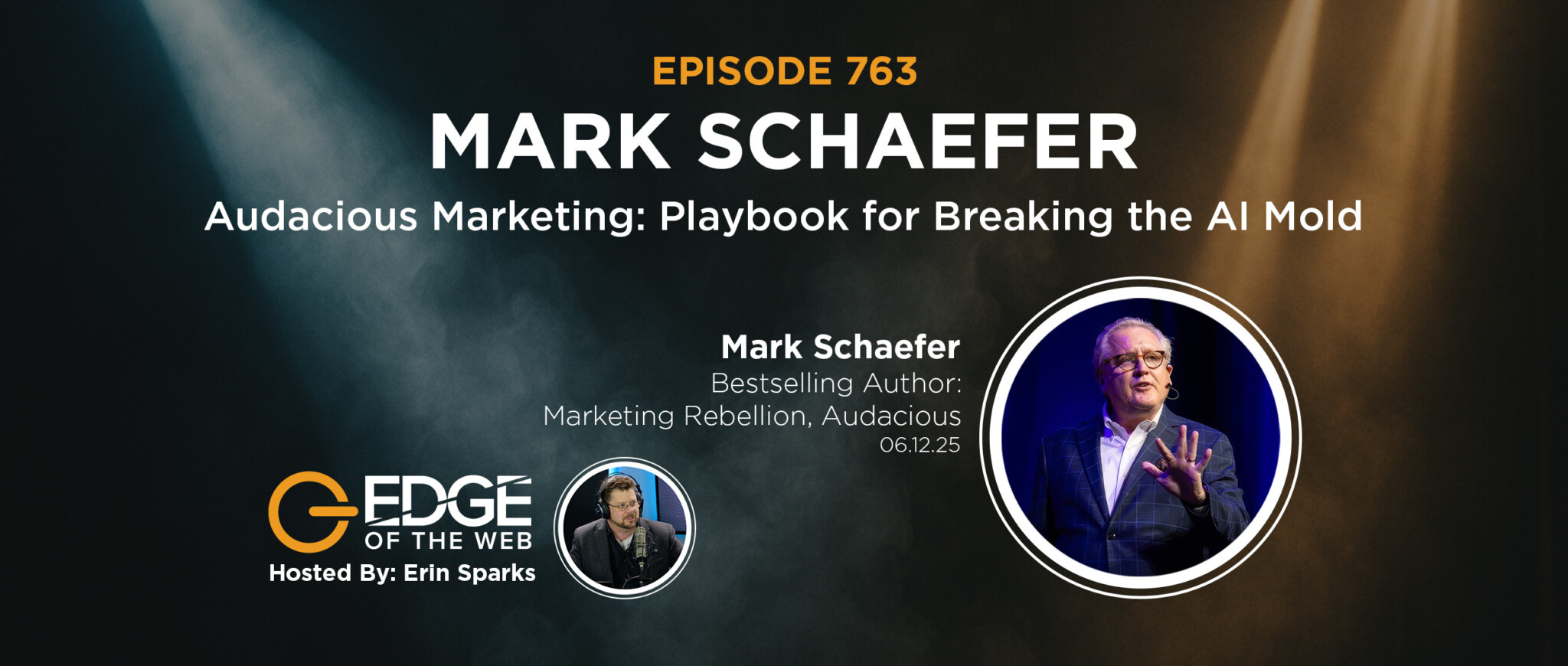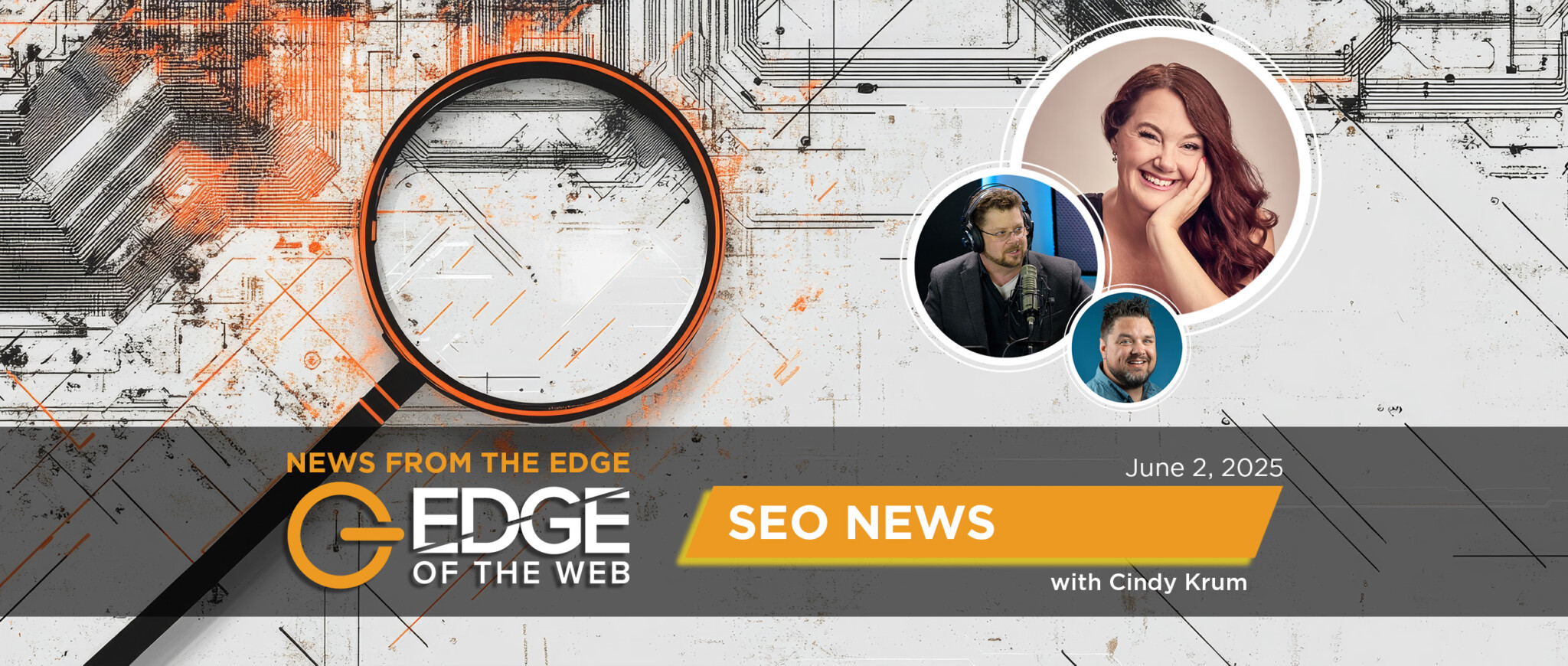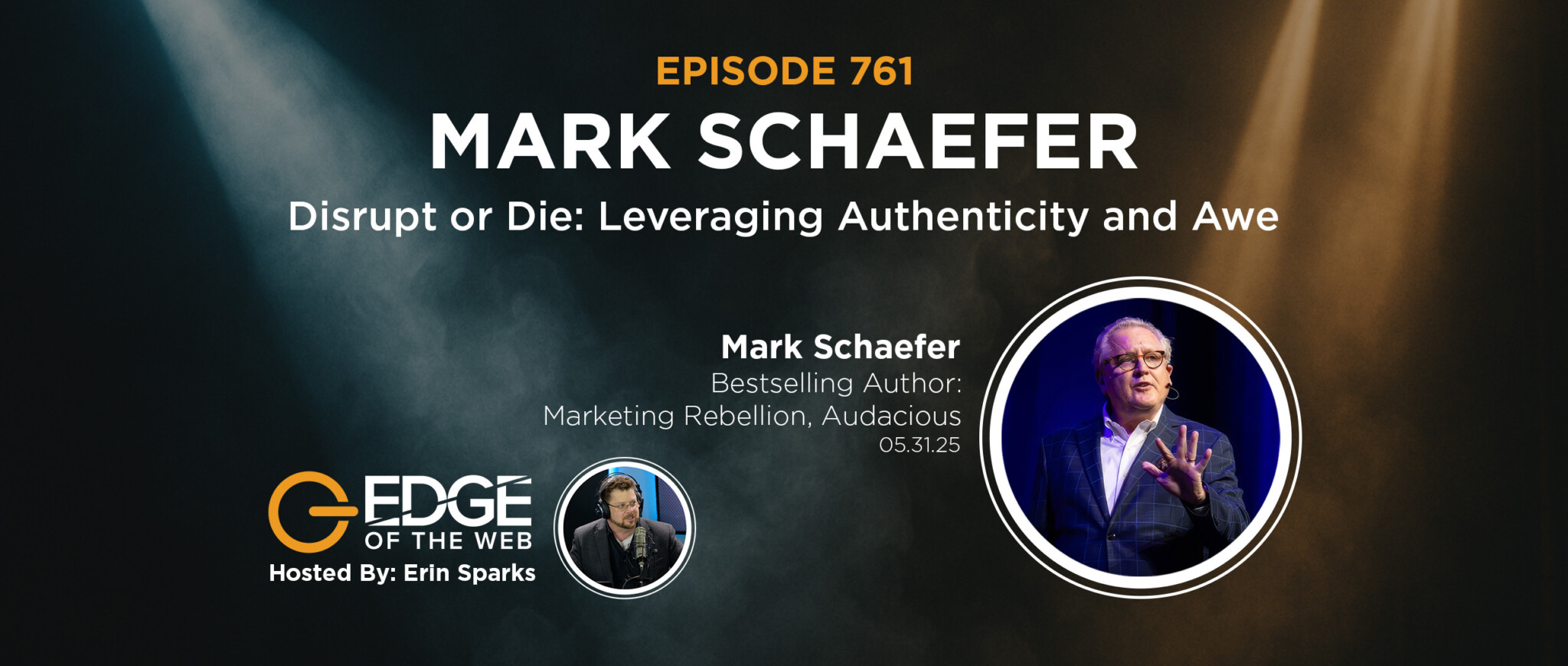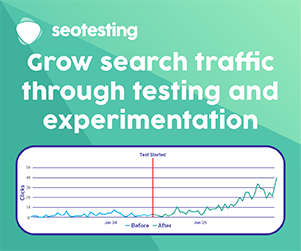News from the EDGE: Week of January 11, 2021
Our digital marketing news headlines this week all revolve around Google in way or another, including how they sell ads, how they’re looking at user intent, and subtopic rankings. Host Erin Sparks and Studio Creative Director Jacob Mann along with Mordy Oberstein, Wix’s SEO Liaison, provide commentary and analysis of on these stories and more in this news roundup from the award-winning EDGE of the Web podcast:
Google Ads Salesperson Alleged to Link Organic Ranking to Ad Spend
On Search Engine Land, Roger Montti reports how a Google Ads Salesperson Alleged to Link Organic Ranking to Ad Spend. A member of the search marketing community tweeted allegations of misrepresentations by a Google Ads salesperson. Danny Sullivan responded with help.
- Erin Sparks: The long and short of this is that Google has always been consistent that buying Google Ads is not tied directly to your organic SEO rankings. But the digital marketer in question was clear that what the Google Ads representative said to the client could only be taken as a kind of “shakedown” in which the client’s ranking could be boosted if they upped their ad spend with Google. A lot of SEOs suspect that this happens, but Google always denies it.
- Mordy Oberstein: I don’t there’s a direct tie. But would a Google salesperson, whose mission is to sell ads, say something like spending more on paid advertising is a way to boost rankings across the board? Sure, that’s totally conceivable. But that doesn’t mean Google is somehow manipulating your rankings up because you’re sending them more money.
- Erin Sparks: What the salesperson said might have been misinterpreted.
- Mordy Oberstein: Yes, to suggest that somehow Google is tying the operation of its algorithm directly to Good ad spends is a bit much even for the Google conspiracy theorists out there. But was the salesperson being too zealous? If so, then that’s not good either.
- Erin Sparks: The Google rep even put the language in an email and sent it to the client. Google’s Danny Sullivan responded with a very clear statement that your Google Ads spend will not increase your SEO at all. He asked the digital marketers to message him the information and that he would follow up on with it because it’s something that should never be said because it doesn’t work that way. He also tried to spin it a different way that the sales rep might have been thinking of some studies that show advertising impacts on SEO or something like that.
- Mordy Oberstein: As one liaison to another, I wouldn’t have tried to spin it. If a sales rep made a mistake, own it and address it. It happens at every company. This is my problem with Google is that they want to act like they never make these kinds of mistakes.
- Erin Sparks: And the someone else jumped in added this to the mix for Danny Sullivan: “If you’re not busy after, I would love to hear your thoughts on: justification for removal of 27% paid KWs, firing of @timnitGebru, hiring of the IRI union busters, your team-up with Facebook to fight antitrust investigations, and Google Ads funding white supremacist sites.” But it’s not Danny Sullivan can answer for all those points, right?
- Mordy Oberstein: No, and it wasn’t really fair to do that. Whether the points are valid and have merit or not is one thing, but you can’t expect him to say anything about all of those controversial points. And if I can call a spade a spade, the guy who posted that is just trying to get some more SEO talk on his Twitter profile as a marketing ploy. If there were going to be substantial discussion of those points, was that the place it was going to happen? No, of course not.
Google launched subtopics ranking in mid-November
Over on Search Engine Roundtable is a story by Barry Schwartz about how Google launched subtopics ranking in mid-November. Google subtopics ranking helps deliver search results with a greater diversity of content when you search for something broad.
- Erin Sparks: So what exactly are subtopics?
- Mordy Oberstein: This is cool. So the example is someone who searches for “exercise equipment.” With the subtopics approach, Google will display various results on the SERP related to subtopics like “inexpensive exercise equipment” or “space-saving exercise equipment” so that by diversifying the results they hope to increase the chances of hitting what the user wants when they haven’t already narrowed it down by what they put in for a query. It breaks a broad search down and shows the subtopics on the SERP. It’s not exactly clear how this is going to look. But you’d expect then that some sites with certain keywords would be ranking better if they align with certain subtopics, but it doesn’t seem like that’s been apparent yet. But if there’s a bunch of subtopic results that still don’t hit the user’s intent, does that mean they’re just getting a bunch of irrelevant results? But if they did a left-panel special results area with the subtopic categories you could click on to see those subtopic results, that would make more sense.
- Erin Sparks: That would be a better way to display separate subtopic result categories.
- Mordy Oberstein: But however they end up doing it, for SEOs it complicates rank track immensely.
- Erin Sparks: And for users that put in that broad search, they start clicking on results and that’s how they can discover what the more narrowly defined search they want to use can be worded. If that step is taken away from them by subtopic results, some of those sites might lose a lot of organic traffic. And how are they going to determine what the subtopics should be? And in what order to present them? Where’s the data to back all that up? And will there be ad space associated with it? Well, of course, there will be.
Beyond Traditional User Intent: Why & How to Go Granular
FromMark Traphagen on Search Engine Journal we go Beyond Traditional User Intent: Why & How to Go Granular. SEO may benefit from looking beyond traditional user intent. Find out what micro intentions are and how they can help increase traffic and site revenue.
- Erin Sparks: The traditional user intent categories are Informational (just looking for info on a topic), Navigational (wants to get to a specific page), Transactional (wants to buy something), and Local (finding something near them geographically). So what are micro-intentions?
- Mordy Oberstein: Take the Informational intent. It’s so broad it doesn’t tell you anything. So an information micro-intention might be comparison information because you want to compare two things. Or maybe you want general educational information on a subject. But just saying a user wants to be informed isn’t very useful.
- Erin Sparks: Take the customer or buyer journey as an example. There’s this idea of ZMOT (zerio moment of truth) consisting of “…all interactions a consumer might have on numerous devices over time that together influence their final purchasing decision.” That’s when they make that purchase decision, whether online or not.
- Mordy Oberstein: The traditional funnel concept makes it all look way neater and tidier than it really is because people go in and out of the funnel and all over the place, it’s a very messy thing in reality. So this is like the subtopics, right? If you’re going to understand user intent, you have to drill down beyond any of the broad user intent categories to figure out the micro-intentions. They’re topics, and topics are concepts, and concepts are entities and that’s what Google is all about these days.
- Erin Sparks: This is the future of SEO, and in that future SEOs will have to have deeper subject matter knowledge than the clients they serve in order to properly identify the topics that will address the micro-intentions of different users and how the different topics relate to each other.
- Mordy Oberstein: And you have to understand it all from the user’s or customer’s perspective. You have to experience things the way users do to really understand it.
And one final note, everyone’s excited to find out Carolyn Lyden Joins The Search Engine Land & SMX team as reported by Barry Schwartz on Search Engine Roundtable. Mordy thinks the world of Carolyn Lyden and praises her as one of the best SEOs in the industry. She has also helped manage the Thursday 1pm eastern time #SEOChat on Twitter.
Connect with Mordy Oberstein, Wix’s SEO Liaison
Twitter: @MordyOberstein (https://twitter.com/MordyOberstein)
LinkedIn: https://www.linkedin.com/in/mordy-oberstein-12551715/
Connect with Erin Sparks, Host of EDGE of the Web and Owner of Site Strategics
Twitter: @ErinSparks (https://twitter.com/erinsparks)
LinkedIn: https://www.linkedin.com/in/erinsparks/



 –>
–>
